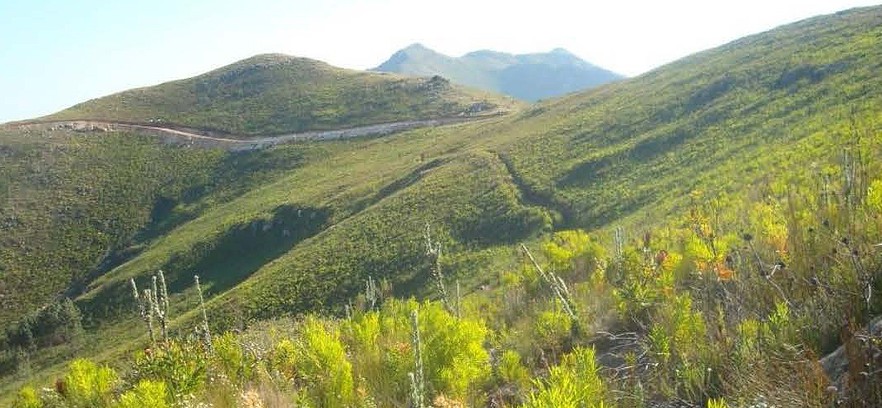Controversial Watsons’ wind farm approval overturned on review
The company has been given until 1 April to appeal against the decision by the Department of Environment
The Inyanda-Roodeplaat wind farm site in the Eastern Cape, taken from the cover of an Environmental Impact Report.
- Approval for the Watson family’s massive Eastern Cape wind farm has been overturned on review.
- This is an about-turn by the national Department of Environment, Forestry and Fisheries.
- Experts say several critically endangered species of eagle will be put at risk by the turbines.
- The company has until 1 April to appeal against the decision.
In an about-turn, Department of Environment, Forestry and Fisheries (DEFF) has refused environmental authorisation for a controversial wind farm in the mountains near Uitenhage.
A review assessment found that the massive wind farm would pose too great a risk to apex bird species in danger of extinction in southern Africa, including the Martial Eagle, Black Harrier and Verreaux’s Eagle (previously known as Black Eagle).
The application to build the 187.2MW, 47-turbine Inyanda-Roodeplaat Wind Energy Facility in the Groot Winterhoek mountains was submitted by Inyanda Energy Projects (Pty) Ltd, a company established in July 2012 by the well-known Watson family of the Eastern Cape.
The directors are Ronald (Ronnie) and Valence Watson, two of the three younger brothers of the late Gavin Watson; Ronnie’s daughter, Tandy Snead; and Valence’s son, Jared.
Ronnie Watson is also the owner of the farms where the wind farm project is planned.
Gavin Watson died in as yet publicly unexplained circumstances in a car crash in August 2019 amidst hearings at the State Capture Commission into the dealings of his services company BOSASA.
In April 2018, despite strong opposition from conservation and tourism authorities, non-government groups and several neighbouring landowners, DEFF issued an initial environmental authorisation for the wind farm.
However, five formal appeals against this authorisation were upheld almost exactly one year later by then Acting Environmental Affairs Minister Lindiwe Zulu. She sent the decision back to the department for further consultation and re-evaluation, to be assisted by independent review specialists.
On 18 February 2021, a new decision by DEFF refused environmental authorisation for the wind farm, conveyed in a letter to director Jared Watson.
In its reasons for the decision, DEFF cited an “independent expert review” report by the CSIR, dated December 2020, which had considered both the initial environmental impact assessment (EIA) of the wind farm and this EIA’s associated specialist bird and ecological studies.
The review found that the initial bird specialist study had understated the impact of collisions during wind farm operations on raptor mortalities, and that mitigation measures proposed in the initial study were “untested and inappropriate” in a South African context.
DEFF said other review report findings from recent risk modelling for Verreaux’s Eagles effectively delineates virtually the entire project area as “high risk” for this species.
“Given the high occurrence of raptors on site and the high mortality risks at a local scale, this is considered sufficient grounds from an avifaunal [bird] perspective to avoid using this site for wind energy facility,” the report said.
DEFF’s reversal was welcomed by bird conservation coordinating group BirdLife South Africa as “important” but also “bitter-sweet”.
“Environmentalists normally embrace renewable energy, but some places are just not well-suited for wind energy infrastructure,” said Dr Hanneline Smit-Robinson, BirdLife SA’s head of conservation.
BirdLife SA noted that the proposed wind farm was located in an almost pristine environment, surrounded by protected areas, and that the application process for the development had been controversial, including allegations that eagle nests had been burned and eagles shot in an attempt to sway the EIA.
Samantha Ralston-Paton, the group’s birds and renewable energy project manager, noted that DEFF rarely refused environmental authorisation and BirdLife SA rarely appealed approvals of proposed wind energy infrastructure.
“This is because most reputable developers abandon those really sensitive sites once they become aware of the risks. We prefer to work proactively with industry to find solutions that allow us to protect nature and mitigate climate change at the same time.”
Inyanda-Roodeplaat is considering filing an appeal against DEFF’s latest decision. Any notice of intention to file an appeal should have been submitted within 20 days, which made 10 March the deadline. However, on 1 March, the wind farm company filed a request for an extension, saying it had not yet been provided with all the necessary appeal documentation by DEFF.
DEFF spokesperson Albi Modise confirmed that the extension request had been granted, to 1 April.
Inyanda-Roodeplaat, through Jared Watson, did not respond to GroundUp.
Support independent journalism
Donate using Payfast

© 2021 GroundUp. This article is licensed under a Creative Commons Attribution-NoDerivatives 4.0 International License.
You may republish this article, so long as you credit the authors and GroundUp, and do not change the text. Please include a link back to the original article.
We put an invisible pixel in the article so that we can count traffic to republishers. All analytics tools are solely on our servers. We do not give our logs to any third party. Logs are deleted after two weeks. We do not use any IP address identifying information except to count regional traffic. We are solely interested in counting hits, not tracking users. If you republish, please do not delete the invisible pixel.

